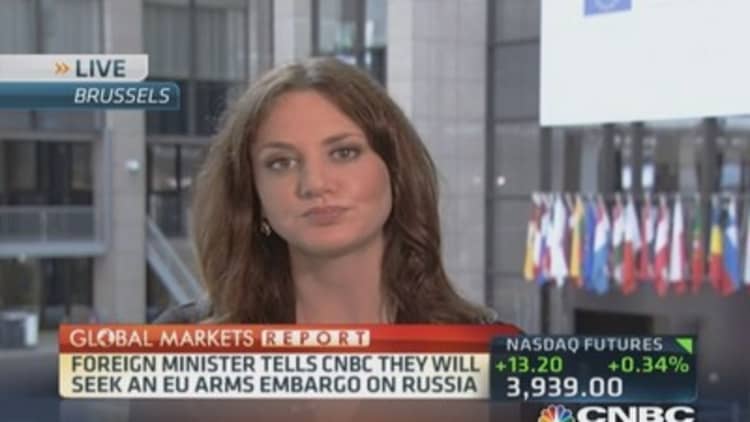The pressure on Vladimir Putin is intensifying. One of the Russian president's most trusted economic advisers on Tuesday launched an unexpected attack on Mr Putin's stand-off with the west.
Alexei Kudrin, a former finance minister and still consulted by the president at least once a month, warned that the isolationist course pursued by some of Mr Putin's advisers ran counter to Russia's business interests. "We have become the west's adversary again," Mr Kudrin said in an interview with state-owned news agency Itar-Tass.
Read MoreBackfire? How Russia sanctions could hit Europe
"There are forces in the country who have long wanted . . . isolation, maybe a certain self-sufficiency. Today this has all fallen on fertile ground."

Mr Kudrin added: "Business wants to invest, build factories, trade. And business is very concerned about the things they hear on the radio and on television."
The downing of Malaysia Airlines flight MH17 – by pro-Russia rebels, according to Ukrainian and US intelligence – has unleashed international outrage at Moscow for its role in the Ukraine crisis .
Analysts who once praised Mr Putin's strategic skills for his seeming mastery of western governments now warn that he has boxed himself into a corner.
Moscow justified its annexation of Crimea and its support for insurgents in eastern Ukraine with the argument that "Russians" everywhere deserve its protection.
Read More EU fails to back up tough talk on Russia, for now
But that now appears reckless, according to analysts. "This runs counter to traditional foreign policy doctrine and Putin's earlier pragmatism and has created fears of Russia as a country that will violate international law," said Fyodor Lukyanov, who chairs the Council on Foreign and Defence Policy, a Moscow think-tank.
He added that Mr Putin would struggle to renounce the new formula because it has helped him rally the nation.
More from the Financial Times:
Cameron accused of hypocrisy on Russia
EU rifts scupper new Russia sanctions
Russia has little to lose from arms embargo
"Vladimir Putin is now in the most difficult situation since he took office," Mr Lukyanov said.
That applies not only to foreign policy. Some observers believe that the threat of harsher western sanctions might be the catalyst for shattering the carefully balanced system through which Mr Putin has ruled for more than 14 years.
Mr Kudrin's warning is being seen by some Russian experts as the first visible sign of a fissure in the ruling elite.
Read More MH17 Ukraine crash: Images from the ground
If so, it has come as international funding for Russian banks and companies is drying up for fear of wider sanctions, which are strangling a sluggish economy.
Growth of gross domestic product, which dropped to 1.3 per cent last year, is expected to slide below 1 per cent this year or even turn negative if further sanctions are imposed.
"The fact that Itar-Tass chose to publish [Mr Kudrin's comments] shows that the liberals in the leadership are putting up a fight over the direction of the country," says Igor Yurgens, a former Kremlin adviser and head of a think-tank close to the prime minister, Dmitry Medvedev.
A former KGB officer, Mr Putin has long drawn advice from both fellow security officials, the siloviki, and reformers proficient in law and economics from his days in St Petersburg's municipal government, in which Mr Kudrin also served.
"I don't think that Putin will find the same cosy coexistence between the siloviki and the modernisers he did in the past, which was possible on the cushion of big oil money," said Mr Yurgens. "Now it's either autocracy and isolation or modernisation."
Read More Russian media on downed airliner: The CIA did it
Conservative ideologues, emboldened by Mr Putin's shift, are pushing hard, proposing measures such as a complete de-dollarisation of the Russian economy.
The cabinet has until now moved slowly, adopting a halfhearted import substitution programme and plans for a new national payments system. But Mr Putin urged Russia on Tuesday to protect its economy better against external risks and defend itself against a hostile west.
"The siloviki look at the west as their enemy and aren't in any way connected with the international economy," said Alexei Makarkin, an analyst at the Centre of Political Technologies in Moscow.
Read More China: Don't rush to blame Russia for MH17
For the oligarchs who control the lion's share of Russia's economy and own global businesses, everything is at stake.
So far, they have remained silent, seemingly fearful of a fate similar to that of Mikhail Khodorkovsky, the oil magnate imprisoned after challenging Mr Putin.
"No matter how much the businessmen will be forced to adapt [by the sanctions] it's still risky for them to go against the state. They're politically weak," Mr Makarin said.


